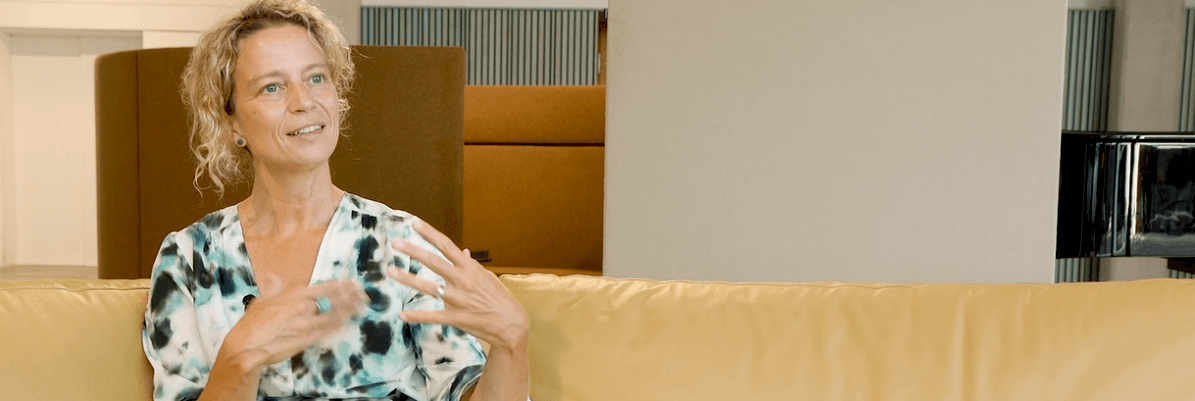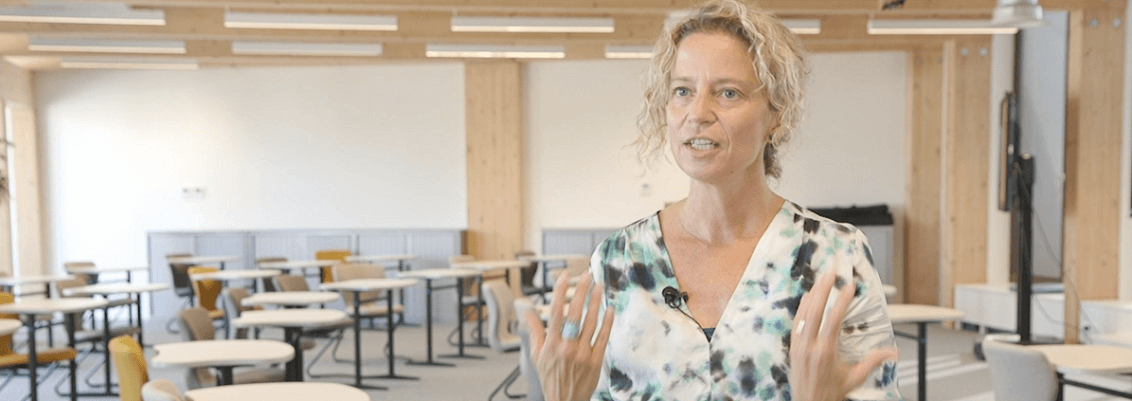- #1: Adopt the Learning-Cycle Idea
- #2: Manage your stakeholders
- #3: Develop resilience and a flexible attitude
Compared to fifty years ago, there is an enormous range of career opportunities that people can embrace. Still, we must be aware of the traditional mindset that many employers and employees still have, and that leaves them entrenched in this old way of thinking about career success.
Ans De Vos and Next Generation Work
For ‘Leave Your Mark’, the TriFinance series of six online conversations with top executives discussing their career paths, Ans De Vos prepared three key messages on careers and career (self) management that any professional should take at heart.
Professor De Vos is SD Worx Chair ‘Next Generation Work’ at Antwerp Management School. Since 2011, she has been researching careers and how careers are evolving in Belgium and abroad. The key topics she focuses on are digitization, flexible working, sustainable employability, and career mobility.
June 3, 2020, professor De Vos was asked by the Flemish Government to join the expert committees on economic recovery & labor market that will advise the government on restarting the economy and creating efficient measures, levers, and recovery instruments for the labor market. In this video, she explains how we can boost our employability by re-thinking the career concept. The text below is an edited transcription of the video keynote.
Ans De Vos Keynote video for 'Leave Your Mark'
Message #1: Adopt the Learning-Cycle Idea
People should think carefully about the meaning of a career. Our shared idea of a career has changed drastically over the last fifty years. Because people still foster traditional views on career (self) management, it is important to do some soul-searching and think about the mental model that you might have about your own career.
Traditionally, a career was thought of as of a linear upwards movement that people make throughout their professional working life. A very predictable model, it offered people a clear view of the skills and experience they needed to take the next step. Very often, that next step was with the same employer in the same type of job, but at a higher level in the hierarchy. Not really a stimulating or motivating model, not only because it is predictable, but also because it has become outdated.
That model has become outdated for many reasons. One reason is that employers simply can no longer offer that kind of predictable career steps because the environment has become unpredictable. How can an organization make promises about the next step, if the organization cannot know what the next year will be like?
Another reason is that careers are becoming much longer. Belgians still retire in their early sixties, but it is a fact that we have to work longer. We must ask ourselves how realistic it is that we continue to do the same things during the forty-plus years of our working life.
Instead of looking at a career as a staircase, we might consider it in terms of learning cycles
Ans De Vos
Wouldn’t it be more realistic to adopt a view on careers that gives us the opportunity to rejuvenate ourselves during our professional careers? After acquiring several competencies and self-insight into what we are good at, what we like to do, and the skills and talents we would like to develop further, it might be time to change employers, to start as an independent, maybe even to start studying again to develop new skills and competencies.
Instead of looking at a career as a staircase, we might consider it in terms of learning cycles. That brings the concept of a career back to its essence: a career is about what you do on a daily basis. By doing your job, you work on your career.
During a learning cycle that starts when you enter a new job, you first learn to do things right, because you must obtain results and fulfill expectations. By doing things differently, you then realize you can get better results. You might even overperform. At the moment you realize you master the context, the job, the company well enough, you can decide where to put your priorities. In every learning cycle, there is an evolution from doing things right to doing things better to doing the right things in your roles.

At the top of such a curve, you might feel a sense of fulfillment. People reward you. Being rewarded for your performance, the evolution becomes visible on your payslip. People ask you for feedback.
At the same time, you might arrive in a comfort zone.
That’s the time to start thinking about how long you want to stay there, and how healthy it is to stay in that comfort zone. It could be the moment to step out of your current job and start a new learning cycle. That might be in the same company, in the same department, in a different department, in a different organization. Changing jobs or roles means going back somewhat in your learning curve. In any new role or job, you have to learn new competencies, meet new people, etc. Eventually, you arrive at a new level of mastery.
Over the years, you might have been working towards a goal that you had set for yourself. But an important consequence of moving through learning cycles is that you become aware of what really matters to you. People change through the experiences they have. The process might challenge you to question your ambition, thinking where you really want to leave your mark. Thinking about what a career is nowadays, that learning cycle idea is very important, much more than this linear, predictable sequence of steps on a ladder.

#2 Manage your stakeholders
A career is something very individual. People who work as a payroll employee work for a company and an employer. It is the employer who owns the job. It is very important to realize that the job does not coincide with the career. You might become unhappy when the employer cuts your job or alters some of the core tasks, but the career is something that you own. It is not owned by an employer. So, the person who cares the most for your career should be you.
The more this individual career approach comes to the fore - compared to organizational career management many years ago - the more it becomes important that people become aware of their preferences, their strengths, their goals, the skills and competencies they want to develop.
All the while, however, you should avoid that this evolves into a setting where it is all about you. A sustainable career, that enables you to realize your career goals, means that you are well aware of all your stakeholders, who are not only situated in a work context but also at home.
That’s why it is important to consider how you can build your social capital in an organizational context. It’s not only about what we do during the course of our working life, but also about who we need in that working life. Who can give us feedback on what we are successful in, but also on what we need to develop? People who can bring us into contact with other people.
The more people change employers, the more important their network becomes. Across the boundaries of the organization, the people in your network might be gatekeepers for next job opportunities or career steps, but they might also be very valuable to have interesting conversations about your career.
Being mindful of those stakeholders at work is important, but at least as important are the stakeholders at home. A career decision you make as an individual is always affected by the context in which you live. That context evolves. It is different to be working as abe single, a young parent, have a spouse who travels a lot for their job. There are many circumstances to prioritize, depending on what people around you need, be it in your private life or in your professional life.
Your employer owns your job. You own your career. The person who cares the most for your career should be you.
Ans De Vos
What we see in research is that the most successful people, in the end, are the ones who manage to establish a healthy balance between what they want, what their employer needs, and what their stakeholders at home need. Those are the ones who in the end manage to work longer and report a higher level of happiness, satisfaction, and mental wellbeing.
In that context, looking for an organization that has a purpose you can relate to is very important. You should, consider what your contribution can be. It is not about you searching for a company that has a nice purpose that you can relate to as long as you want, but also about the contribution you want to make, given the values and purpose you have. It is also about how long you should stay and about the patience you should have to stay in a certain job, to work for a certain project until you leave a mark.
Job hopping and job mobility are important because it increases your social capital and employability. Changing jobs for the sake of changing, you might end up starting a lot of things but never accomplishing something. In that case, the idea of searching for a purpose becomes really shallow.

Message #3: Develop resilience and a flexible attitude
Organizations and professionals are still trying to predict their future as much as possible. The past months, however, we saw that rational predictions, like ‘plan’, ‘do’, ‘check’ are no longer working.
The most successful people are most often not the ones who have this perfect career plan at the very start and who start executing it according to the milestones they have set for themselves, but the people who are prepared for opportunities, but also for setbacks, by knowing who they are, when they are at their best and what kind of values they have. Having that kind of self-insight makes you prepared for all kinds of changes.
Looking at future skills that are important for successful careers where people are continuously employed, maybe interrupted by periods of unemployment, new learning, or taking a step back for whatever reason, it is important that you develop resilience.
Develop a flexible attitude. Focus on changes around you and think about how you might deal with those changes, even though you are a person that prefers predictability, order, and structure.
Those are in fact the critical skills for the future that we see popping up in international research, but also in Belgian studies. This capability to adapt to change will become much more important than finding this perfect match between you and a lifetime career because it is naive to think that neither you nor the context of that career will change during your working life.
I wish you the best of luck in pursuing such a career!
Related content
-
Reference case
How Data kickstarted a transformation at a leading financial institution
-
Reference case
Helping a major bank turn complexity into structure: Olivier Renard on his digitalisation mission
-
Blog
Final Call: E-invoicing
-
Article
The CFO as the conductor of change management in (Finance) Transformations
-
Reference case
Setting the standard for CSRD at a leading European retailer
-
Article
Beyond complexity: Driving sustainable change at a large Belgian insurer with TriFinance
-
Career as Consultant
Junior Finance Consultant | Public Sector
-
Career as Consultant
Medior Finance Consultant | Public Sector
-
Career as Consultant
Senior Finance consultant | Public sector
-
Career as Consultant
Junior Consultant Public Procurement | Public Sector
-
Career as Consultant
Medior Consultant Public Procurement | Public Sector
-
Career as Consultant
Senior Consultant Public Procurement | Public Sector